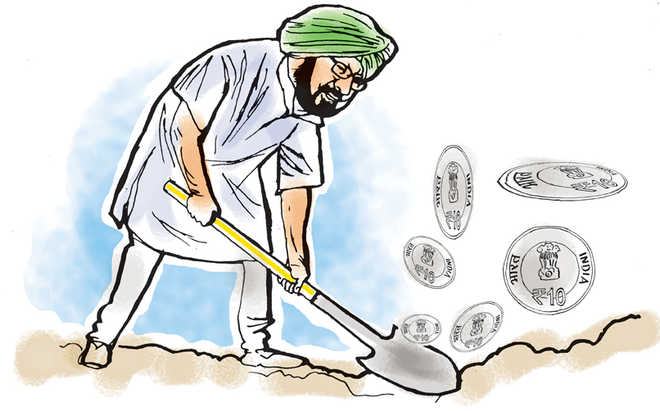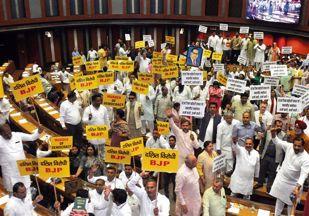
Illustration: Sandeep Joshi
The Tribune Team
It began with Karza, kurki khatam, fasal di puree rakam. It was a catchy slogan that the Congress coined to garner the support of the state's farming community to return to power in Punjab after a decade. Almost a year later, karza (debt) is as hated and sufferable as ever. Kurki (seizure of a defaulter's property) is as grim a prospect as ever and fasal (crop) is as unpredictable and unprofitable as ever. So where has Chief Minister Capt Amarinder Singh landed himself? Each day the gap between his promise and the reality is gnawing at the farmers. And farm experts, who have betted against the competitive politics of loan waiver are scratching their head in the face of emerging complications that Punjab's small farmers are forced to contend with.
The greater economic danger comes from other states as well: Uttar Pradesh Maharashtra. For instance, the cumulative debt relief announced by the three states amounts to around Rs 77,000 crore or 0.5% of India's 2016-17 GDP, according to analysts. State-wise outstanding farm debt has been scaled up to the total value of institutional farm loans at Rs 12.6 trillion. This figure was cited by Union minister of state for agriculture Parshottam Rupala about two years ago.
In Punjab, the government has added two more instruments for extending such sops: self-declaration by recipient-farmers and social audit. The farmers say they face a social problem of being declared a borrower which would bring only 'infamy.' And by complaining against an "unqualified recipient," they may face a violent situation. A much watered-down scheme (see infographic) was launched in Punjab this month. Here are ground reports from three districts: Bathinda, Sangrur and Muktsar:
In Bathinda, shock & awe for small farmers
Bathinda: A worried Gurmail Singh of Jodhpur Pakhar village stands in a corner at a gathering of farmers in his village. He and his brother Gurjant have 1.5 acres each, but only Gurjant figures on the list of beneficiaries.
Gurmail says the state government has tweaked the scheme, further delaying its implementation. "The self-declaration clause about landholdings will prolong the wait for relief," he rues.
“I owe Rs 60,000 to the cooperative society, Rs 3 lakh to the bank and Rs 2 lakh to a commission agent. I have also mortgaged whatever land I have to make both ends meet. I expected to get rid of the society's debt with the scheme's launch. I am barely surviving.” He has to look after his aging father, wife and a child. Gurmail is not alone. Badal Singh of Gehri Bara Singh village and his two brothers own one acre each, but he was left out of the scheme. Badal Singh says revenue officials have told him to meet the SDM.
Farmers allege that political affiliation has crept into the list. Sukhmandar Singh of Jhumba Bhaika village says he owns 3 acres and owes Rs 75,000 to the cooperative society, but he was not included because he is an Akali Dal supporter. Another farmer from Mansa Kalan village says the debt of a farmer was waived, but not that of his two brothers, both of whom are Akali supporters and own 2.5 acres each.
BKU (Ekta Sidhupur) chief Jagjit Singh Dalewal says the state government has miserably failed in delivering what it promised. “First it promised a complete waiver. But what was launched was a much watered-down version. Second, the scheme has various loopholes even after including the social audit clause. And third, the bureaucrats have designed the policy in such a way that the government would end up spending very little on the waiver while at the same time the list of beneficiaries will also remain long.”
The cooperative societies asked the farmers to also inform them of the land on lease they have. The apparent objective, says Dalewal, was to provide seeds and fertilizers. Later, the societies treated this lease-land as the one “owned by the farmers” to deny them the benefit. Dalewal says debt waiver is no solution. “The government should focus on making agriculture financially viable.” — Perneet Singh
Edgy officials, fuming farmers in Sangrur
Sangrur: Almost all employees of the cooperative department are in dark about the self-declaration clause. “Unofficially I'd say that most likely, the government would seek debt details from all farmers through self-declaration forms,” says an officer requesting anonymity.
Most farmers are very upset over the social audit clause. “Banks are not allowed to display lists of defaulters as it is personal information. Then under which law is the state government conducting social audit and defaming the indebted farmers?” asks Gurmeet Singh, a farmer from Mehla Chownk village. Another farmer, Sukhwinder Singh from Maura village, alleges that such an audit has created serious social problems.
Kuldeep Singh, a farmer from Bhai Ki Pashore village is uncertain about any relief. The Singhs are three brothers and have only one acre of land. The family has taken a loan of Rs 28,000 from the cooperative society. His family got a waiver of Rs 1,400, and he does not know who has done it.
The announcement about self-declaration has confused the cooperative department officials. “In Sangrur, there are around 70,000 eligible farmers. Around 35,000 farmers are on first list. The rest hope to find a mention in the second list. “We would start taking self declaration of all farmers individually after getting the official copy of the notification,” says Baljinder Singh, deputy registrar of cooperative societies in Sangrur. — Parvesh Sharma
How the rich get a waiver in Muktsar
Gidderbaha (Muktsar): The Assembly segment is represented by Youth Congress chief Amrinder Singh 'Raja Warring', who recently met the CM and the state party chief and pressed for better implementation of the scheme. Here's how the scheme is playing out: the government waived Rs 44,674 of Jaswant Singh of Gurusar village. He owns nearly 16 acres. His two-storey palatial house, SUVs and other vehicles tell as much about his prosperity.
Jaswant’s younger son, Parampal, is shown as a marginal farmer in government records. Parampal was also the chief of the Youth Congress, Gidderbaha block. “We had not applied for a debt waiver. My father had got a crop loan on four acres through the cooperative society of Madhir village and his name appeared in the list of beneficiaries. This surprised us. We have bought our assets by our sources of income,” says Parampal.
Hargopal Singh, secretary, co-operative society, Madhir, tries to clear the air. “Jaswant is included in the list because as per our records, he falls in the category of farmers owning less than five-acres,” says Hargopal.
Officials at the Muktsar Central Co-operative Bank branch at Madhir village refused to share any information, saying the bank had sent the lists of indebted farmers to the head office. The bank divided the list in three categories: those who own up to 2.5 acres, above 2.5 acres and less than five acres and above five acres. When the lists came out, many farmers complained that they had been left out. “We are unaware as to at what level the names were deleted and on what criteria,” says a bank official.
Paramvir Singh Bhandari, manager of the Muktsar Central Cooperative Bank, said the bank has not yet received any notification or circular about the social audit or self-declaration forms. “We are matching the list of beneficiaries with our records. Sometimes a farmer shows less landholding, but as per revenue records he owns a huge chunk. This is the main problem.”
“In the Gidderbaha sub-division, 5,253 farmers were named as beneficiaries in the Annexure-A prepared by the department. These farmers were those having land less than 2.5 acres, got loan from the cooperative societies and their Aadhaar card was linked to the bank account and verified. However, when the list was again sent to the officials of department of cooperative, they made a final list called Annexure-B of only 1,747 farmers. I am not aware on what basis the deletions were made,” says Narinder Singh Dhaliwal, SDM, Gidderbaha. — Archit Watts
Not much left — months later
Pre-poll promise
October 2016: Capt Amarinder Singh announces he will waive all debts taken by farmers, if voted to power. He asks farmers to stop repaying their loans.
Rs 95,000 crore estimated as the total farm debt (from banks and private sources).
32 lakh farmer accounts show debt of Rs 72,000 crore from all banks, according to state-level bankers committee.
Post-poll reality
March 2017: In first cabinet meeting, the CM reiterates full waiver, sets up a panel.
June: After a few meetings with the expert panel headed by T Haque, the govt realizes it has no resources to waive all debts.
June-end: Govt says Rs 2 lakh crop loan due to small & marginal farmers to be waived.
10.25 lakh are the estimated beneficiaries.
Rs 9,500 crore the combined debt to be waived/written off. No term loans to be waived. Large farmers won't get any relief.
July-September: Govt explores options to raise resources — from floating masala bonds to Centre's intervention — to no avail.
October: Crop Loan waiver scheme notified. Now, all small farmers who have availed of loan of over Rs 2 lakh become ineligible.
November: Govt raises a loan of Rs 4,680 crore from a consortium of six banks. The hike in market fee and rural development fee (1% each) to be used for paying interest.
January 7, 2018: The scheme finally takes off. Only 46,000 farmers get a waiver of Rs 167 crore in the first phase
(Compiled by Ruchika M Khanna)
- The primary agriculture cooperative societies (PACSs) started short-listing the farmers having land up to 2.5 acres as well as those with land between 2.5 and 5 acres. These societies then submitted the proposed list after approval by their respective committee members and signed by their secretary, circle inspector and auditor of the co-op department.
- The secretaries of the societies then submitted these lists to their cooperative bank managers who forwarded them to their head office. The lists were uploaded on the debt waiver portal after verification by revenue department officials. The final list was then sent to the cooperative societies, which pasted them in villages as part of social audit.
- For transparency, the authorities also carried out a social audit: a team of revenue and cooperative department officials along with sarpanch and nambardar check the accounts of farmers mentioned on the list. The self-declaration exercise is yet to begin.



























